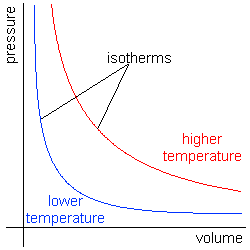As the title suggests, i have a question regarding Boyle's law.
As Boyle's law states that "The volume $V$ of a given mass of a gas, is inversely proportional to the pressure $p$ applied to it when the temperature $T$ is constant."
So if we had a gas at say a pressure $p_1$, and a volume $V_1$, corresponding to this pressure at a constant temperature $T_1$.
Now if i were to increase the the temperature of this gas to a new temperature $T_2$ and make it constant. And then apply the same pressure $p_1$ on the gas would the volume still be $V_1$?
Considering the fact that volume and pressure are inversely proportional for a constant temperature, and hence they dont depend on the temperature?? Am i right?
Thanks

